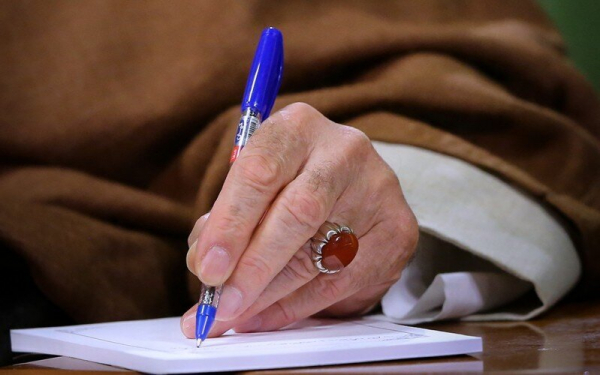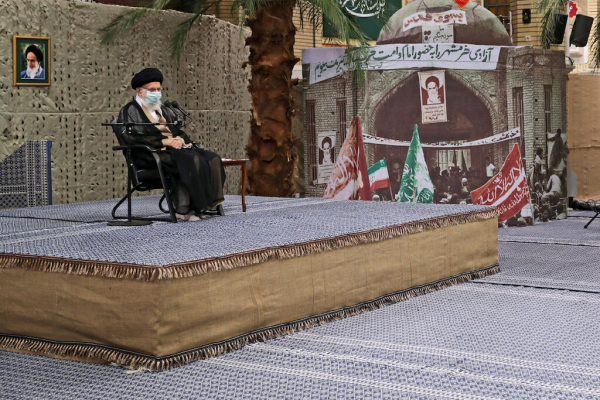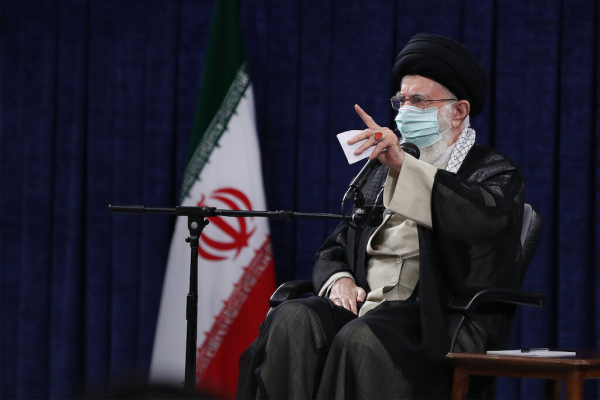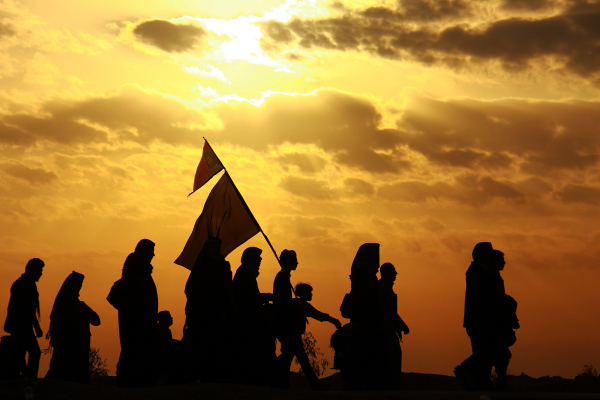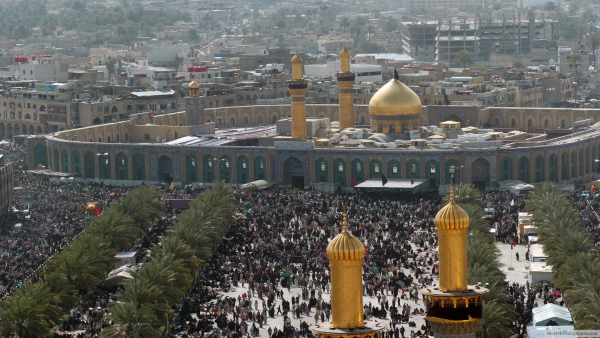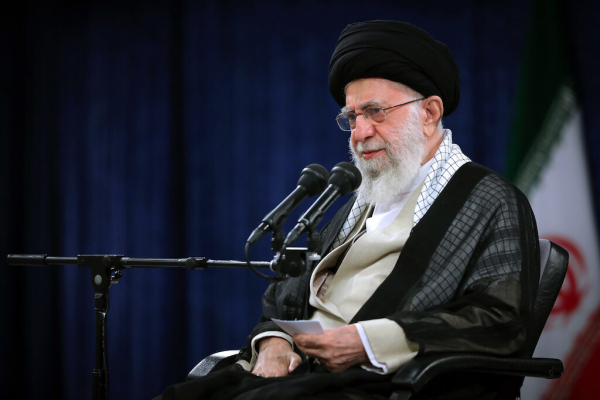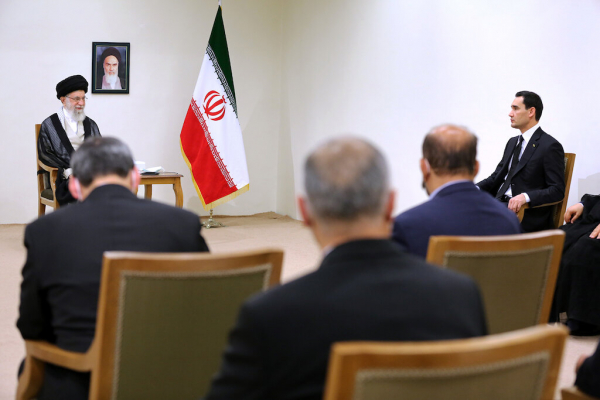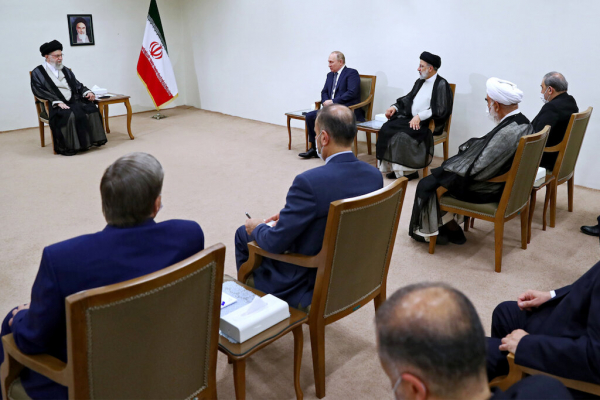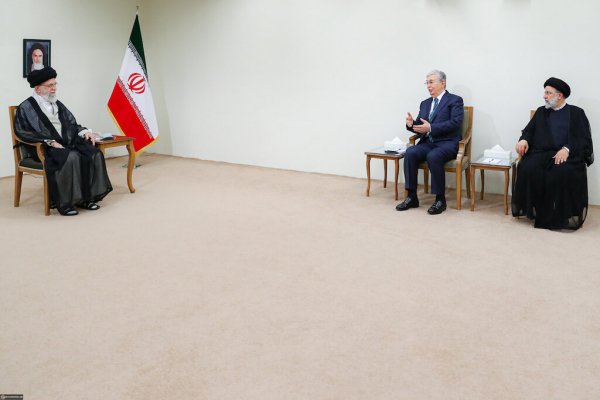hasania
Imam Khamenei's message addressing the Sacred Defense Week
In the Name of God, the Compassionate, the Merciful
The best, most fitting time to commemorate the memory and names of our dear martyrs and to hear their message is during Sacred Defense Week.
The martyrs’ message is glad tidings for hearts that are ready and ears that listen. Their precious message reminds us that standing up to the Satans of power and oppression will ultimately end in victory and the elimination of fear and grief.
Their message gives us life, strength, and hope. The great nation of Iran and all the free people of the world have a need for their message today and forever.
May God’s greetings be upon our dear martyrs.
Sayyid Ali Khamenei
Sept. 22, 2022
Islamic Revolution is a threat to global imperialism which they can't stand
On the eve of Sacred Defense Week, a number of veterans, commanders, those who fought in the Sacred Defense, and the families of martyrs met with the Leader of the Islamic Revolution this morning in the Imam Khomeini Hussainiyah.
In the beginning of his statements, the Leader of the Islamic Revolution stated that the war against Iran was an “international war” during the Sacred Defense. He referred to the role of many foreign entities in this war and said, “At one time, we asserted that all of the world powers are fighting us. But now, those who said that this was just a claim on our part are admitting to this themselves.”
Imam Khamenei explained that the Imposed War on Iran was global imperialism’s natural reaction to the victory of the Islamic Revolution. He said that the purpose of the Imposed War was to prevent the message and new words of the Iranian nation from being passed on to other nations, messages such as standing firmly, not fearing the US, and resisting global oppression and discrimination.
The Leader of the Islamic Revolution went on to add, “The Islamic Revolution of the Iranian nation was not just the defeat of a dependent, corrupt system and a temporary blow to the US and the Arrogant Powers. It was a threat to the domineering system of global imperialism. The Arrogant Powers of the West and the East understood the seriousness of this threat. Thus, they imposed a war on the Iranian nation by encouraging and inciting Saddam.”
The Leader said that the main goals of the vengeful Arrogant Powers in imposing this war on Iran were to divide Iran, separate Khuzestan from Iran as an important part of the country, bring the Iranian nation to its knees, overthrow the Islamic Republic, and take the fate of the Iranian nation in its own hands. He said that it is important not to forget these obvious facts.
In another part of his speech, the Leader of the Islamic Revolution spoke of the deterrence power of the Islamic Republic, “Today, the country’s military defense system has reached a position where it has the capability of deterring foreign threats. There is no need to fear foreign threats. The enemies are fully aware of this fact.”
Furthermore, the Leader explained that one of the achievements of the Sacred Defense was that it proved an important principle to the Iranian nation. He emphasized this point that, “During the Sacred Defense it was proven that safeguarding the country and deterring the enemies’ threats is only possible through resistance, not submission.”
With regard to this, the Leader reminded of the need to put into use the principle of resistance in various political, economic, and cultural matters. He called people’s attention to this point that, “This intelligent resistance showed the enemy that they must always take Iran’s internal strength into consideration in their calculations. Why? Because it is with this spirit that we have been able to defeat the enemy in many cases, such as their imposing maximum pressure, designing a project for a 'New Middle East', and transgressing our borders by air and sea.”
Once again, he also stressed the need for correct reporting. He explained, “The work that has been done in this field so far has been good. But all of these have been infrastructural so far. The results of this work must be seen.”
At the end of his statements, the Leader of the Islamic Revolution emphasized that responding to the false, distorted reports of the Holy Defense and the Islamic Revolution itself is something that is mandatory. He said, “The US and Zionists are busy in this field writing books and producing films. Intellectuals and artists need to work and take appropriate action to confront them.”
In the beginning of this meeting, Major General Mohammad Bagheri, Chief of Staff of the Armed Forces, presented a report describing the programs and activities that have been carried out with the goal of preserving and promoting the culture and values of the Sacred Defense.
The assault on hijab is part of the Western colonial logic which must be exposed
On the occasion of the anniversary of the first Friday Prayer organized after the Islamic Revolution in 1979, Imam Khamenei met with Friday Prayer leaders from across the country in the Imam Khomeini Hussainiyah on July 27, 2022. The following are some of the main points he stated during this meeting.
The Leader of the Islamic Revolution met with Friday Prayer leaders on July 27, 2022. In addition to describing the social and religious benefits and aspects of the Friday congregational Prayer in this meeting, Imam Khamenei referred to the great accomplishments Iranian women have achieved while wearing hijab. He emphasized that the assault on hijab is based on a part of the colonizer’s logic and that this must be exposed.
Highlighting issues related to women and hijab, Imam Khamenei stated, “Such issues have continuously been brought up since the beginning of the Revolution. Recently too, the same futile attempts are being made using the excuse of hijab.”
The Leader of the Islamic Revolution added, “It is many years now that the West has been saying that as long as women are not freed from moral and religious boundaries and coverings, they cannot make progress and reach higher scientific, political and social positions. But over the course of more than four decades, Iranian women have been able to be present in scientific, social, athletic, political, managerial, economic and cultural fields. They have achieved great accomplishments, all while wearing the Islamic hijab and the chador.”
While speaking about remembering the Household of the Prophet (pbuh) during the special times that are related to them, Imam Khamenei highlighted the importance of the Friday Prayers. He referred to its unique status among the religious duties and said, “The bond between paying attention to God and the people coming and their gathering together, everyone remembering God as a group and the showering of blessings on the people, the continuation of Friday Prayers every week without a break, functioning as an important base for bringing up various social matters including intellectual issues, social services, public cooperation, and military preparedness and deployment, and combining religion with politics are some of the most important characteristics of the Friday Prayers. These factors have turned it into a great, extraordinary opportunity.”
He also added, “Friday Prayers, with such characteristics, are an important link in the long chain of the soft power of the Islamic Republic.”
The Leader of the Islamic Republic then discussed whether the Islamic Republic has been able to give Friday Prayers their due status. The Leader stated, “It seems that we have shown some negligence in this regard, and we should work hard so that these shortcomings will be eliminated. Some of this work is the responsibility of the Friday Prayers leaders themselves, and some of it should be carried out through macro-management.”
The Leader of the Islamic Revolution discussed two points about the Friday Prayer leaders: 1. The behavior and lifestyle of Friday Prayer leaders and 2. The content of their sermons.
As for the first point, Imam Khamenei stated, “In the same way that the Friday Prayer leaders invite everyone to piety during the Friday Prayers, they should do their best to be pious and act on this advice themselves. Otherwise, the opposite results will be seen.”
He considered a fatherly behavior toward everyone as being another requirement for the Friday Prayer leaders, and added, “People from different levels of society and with different tastes participate in the Friday Prayers. Therefore, the leaders of the Friday Prayers should behave with everyone the way they behave with their own children, and they should bring everyone to sit at the banquet table of spirituality and religion.”
The Leader also referred to the millions of people who participated in the celebration of Eid al-Ghadir in Tehran and the attendance of people with varying appearances and from different social backgrounds. He said that this was an astonishing phenomenon and added. “In that celebration, individuals from all walks of life participated and everyone is in favor of religion despite their various appearances.”
In his next recommendation, Imam Khamenei advised Friday Prayer leaders to adopt a popular approach. He recommended that they be among the people and talk with them. He said, “The mere act of being among the people is an important task. Therefore, do not stay away from the people and do not confine your communications to a particular group of people. Of course, over the years the network of Friday Prayer leaders has been one of the revolutionary organizations that has involved the general public the most.”
Being in contact with the youth was another recommendation made by the Leader of the Islamic Revolution.
Pointing to the presence of a great number of young, volunteering, self-effacing, unpretentious groups throughout the country, the Leader stated that it is the duty of Friday Prayer leaders to be in contact with these groups and to support them. He also emphasized, “Participating in social services such as helping the people during natural disasters and the Coronavirus along with collecting voluntary monetary help for the needy are other duties of the Friday Prayer leaders. Some Friday Prayer leaders have shone brightly in these areas.”
Imam Khamenei stressed, “We advocate justice and have raised its flag, but the realization of justice without helping the underprivileged classes of people does not have any real meaning.”
The Leader of the Islamic Revolution also recommended, “Economic activities, even in the form of covering the expenses of the Friday Prayers, should be avoided, because the negative consequences of the involvement of some honorable gentlemen in these activities continues to harm the Islamic Republic.”
Narrations on Karbala and the pilgrimage of Imam Hussain (as) part 2
Hadith 21: The Condition of Honor
Imam Sadiq (as) said: Whoever wants to be in the neighborhood of the Prophet (pbuh&HP) and next to Ali (AS) and Fatima (AS) should not leave the pilgrimage of Imam Hussain (AS).
Wasa'il al-Shi'ah, vol. 10, p. 331, p. 39
Hadith 22: Pilgrimage, Divine Duty
Imam Sadiq (as) said: If one of you observes the Ihram of Hajj for the entire of his life but does not visit Imam Hussain (as), he has left the right of the Messenger of Allah (PBUH&HP) because the right of Hussain (as) is a divine duty and obligatory for every Muslim.
Wasa'il al-Shi'ah, vol. 10, p. 333
Hadith 23: Karbala, the Kaaba of Perfection
Imam Sadiq (as) said: Whoever does not visit the grave of Imam Hussain (as) until he dies, his faith will be incomplete and his religion will be incomplete, and when he goes to heaven, he will be lower than the believers there.
Wasa'il al-Shi'ah, vol. 10, p. .335
Hadith 24: From Pilgrimage to Martyrdom
Imam Sadiq (as) said: Do not leave the pilgrimage of Imam Hussain (as) and recommend it to your friends and companions as well! May Allah prolong your life, increase your sustenance, and may Allah bless you alive and you will not die except as a martyr.
Wasa'il al-Shi'ah vol. 10, p. 335
Hadith 25: The Hadith of Love
It was narrated from Imam Sadiq (as) that he said: Whoever Allah wants good, will put the love of Hussain (AS) and his pilgrimage in his heart, and whoever Allah wants bad, will have him hate Hussain (AS) and anxious with his pilgrimage.
Wasa'il al-Shi'ah vol. 10, p. 388, Sea of Lights, vol. 98, p. 76
Hadith 26: A Sign of Being a Shiite
Imam Sadiq (as) said: Whoever does not visit the grave of Imam Hussain and dies as our Shiite and dies, is not our Shiite, and even if he is from the people of Paradise, he is the guest of the people of Paradise.
Kamel Al-Ziyarat, p. 193, Bihar Al-Anwar, vol. 98, p.4
Hadith 27: Ascension Platform
Imam Sadiq (as) said: Whoever visits the grave of Hussain (as) and has knowledge of the right of that Imam, Allah Almighty will register him in the highest rank.
Man la yahzurul Faqih, vol. 2, p.581
Hadith 28: The School of Knowledge
Imam Musa Kadhim (as) said: The least reward that is given to the pilgrim of Imam Hussain (as) on the banks of the Euphrates is that all his sins, before and after, are forgiven. Provided that he knows the right, honor and guardianship of that Imam.
Mustadrak al-Wasa'il, vol. 10, p. 236, quoting Kamil al-Ziyarat, p. 138
Hadith 29: Like the Pilgrimage of Allah
Imam Reza (as) said: Whoever visits the grave of Imam Hussain (as) on the banks of the Euphrates is like the one who has visited Allah.
Mustadrak al-Wasa'il, vol. 10, p. 250, quoting in full
Chapter Three: Ashura and Arbaeen
Hadith 30: Pilgrimage at Ashura
Imam Sadiq (as) said: Whoever visits Imam Hussain (as) on the day of Ashura, heaven will be obligatory for him.
Iqbal al-A'mal, p. 568
Hadith 31: Above Prosperity
Imam Sadiq (as) said: Whoever wakes up on the night of Ashura next to the shrine of Imam Hussain (as), on the Day of Judgment he will rush to Allah stained in his blood, like someone who was killed in Karbala next to Imam Hussain (as).
Wasaelu shiah, vol. 10, p.372
Hadith 32: Signs of Faith
Imam Hassan Askari (as) said: The signs of a believer are five:
1 Fifty prayers
2 Arbaeen pilgrimage
3 Ring in the right hand
4 Prostrating on the ground
5 Saying loudly the name of Allah, (Bismillah Rahman Rahim)
Wasaelu shia, vol. 10, p. 373, and also Al-Tahdhib, vol. 6, p. 52
Chapter Four: Torbat and Tasbih of Love
Hadith 33: His Porch
The Prophet of Islam (PBUH&HP) said: Know that the answer to prayer is under the dome of his shrine and healing is in his soil, and the Imams (as) are of his children.
Mustadrak al-Wasa'il, vol. 10, p.335
Hadith 34: Soil and Training
Imam Sadiq (as) said: Take your children with the soil of Hussain (as) (Karbala) because the soil of Karbala insures your children.
Wasaelu Shiah, vol. 10, p.410
Hadith 35: The Greatest Medicine
Imam Sadiq (as) said: The cure for any pain is in the soil (torbat) of Hussain (as) and it is the greatest medicine. Kamil Al-Ziyarat, p. 275 and Wasa'il al-Shi'ah, vol. 10, p. 410
Hadith 36: Torbat (soil of Karbala) and seven hijabs
Imam Sadiq (as) said: Prostration on the soil of Hussain (as) tears the seven veils.
Mesbah al-Muttahid, p. 511, and Bihar al-Anwar, vol. 98, p. 135
Hadith 37: Prostration on the Soil of Love
Imam Sadiq (as) did not prostrate on the ground except on the soil of Hussain (as) and he did this in violence for the sake of Allah.
Wasailu shiah vol. 3, p.608
Hadith 38: Rosary with the Soil of Karbala
Imam Sadiq (as) said: Prostration on the soil of Karbala can light up to the seventh earth, and whoever has a rosary from the soil of the shrine of Hussain (as) with him, is a truthful person, even if he says nothing.
Man la yahzurulFaqih vol 1 p 268
Hadith 39: Healing Soil
Imam Kadhim (as) while narrating a hadith announcing his death, said: do not take anything from the soil of my grave to seek blessings, because it is forbidden for us to eat any soil except the soil of my grandfather Hussain (as), Allah Almighty has healed only the soil of Karbala for the Shiites and our friends.
Jami ahadith, vol. 12, p.533
Hadith 40: One of the Four Needs
Imam Musa ibn Ja'far (as) said: Our needs are four things:
1. Prayer mat on which prayers are offered.
2. Rings on the finger
3. Toothbrush with which to brush teeth
4. A rosary from the shrine of Imam Hussain (as) Tahdhib al-Ahkam, vol. 6, p. 75
Narrations on Karbala and the pilgrimage of Imam Hussain (as) part1
Chapter One: The Virtue of Karbala
Hadith 1: Pure Privacy
The Prophet of Islam (PBUH&HP) said in a long hadith: Karbala is the purest tomb on earth and the highest in terms of respect, and it is true that Karbala is one of the expanses of Paradise.
Bihar al Anwar, vol. 98, p. 115, Kamil Al-Ziyarat, p. 264
Hadith 2: The Land of Salvation
The Prophet of Allah (PBUH&HP) said: My son Hussain will be buried in a land called Karbala, a privileged land that has always been the dome of Islam, just as God saved Noah's faithful companions from the flood there. Kamil Al-Ziyarat, p. 269, Chapter 88, H8
Hadith 3: The Slaughterhouse of Love
Imam Ali (as) passed through Karbala one day and said: This is the altar of lovers and place of martyrdom of martyrs whose place neither the past nor the future martyrs can reach.
Tahdhib, vol. 6, p. 73 and Bihar, vol. 98, p. 116
Hadith 4: The Perfume of Love
Imam Ali (as) addressed the soil of Karbala and said: What a fragrance, O soil! On the Day of Judgment, a people will rise from you who will go to heaven immediately and without reckoning.
Explanation of Nahj al-Balaghah Ibn Abi Al-Hadid, vol. 4, p. 169
Hadith 5: The Red Star
Imam Sajjad (as) said: The land of Karbala, on the Day of Judgment, shines like a pearl star and cries out that I am the holy land of God, the pure and blessed land that surrounds the leader of the martyrs and the ruler of the youth of Paradise. Kamil al-Ziyarat, p. 268
Hadith 6: Karbala and Jerusalem
Imam Sadiq (as) said: Karbala is from the land of Jerusalem.
Kamil Al-Ziyarat, p. 269, Chapter 88, H7
Hadith 7: Euphrates and Karbala
Imam Sadiq (as) said: The land of Karbala and the water of the Euphrates were the first land and the first water which Allah Almighty sanctified and honored.
Bihar Al-Anwar, vol. 98, p. 109 and also Kamil Al-Ziyarat, p. 269
Hadith 8: Karbala, the Kaaba of the Prophets
Imam Sadiq (as) said: There is no prophet in the heavens and the earth unless they want Allah Almighty to allow them to visit Imam Hussein (as). It is as if a group descends to Karbala and a group ascends from there. Mustadrak al-Wasa'il, vol. 10, p. 244
Hadith 9: Karbala, Mataf of the Angels
Imam Sadiq (as) said: There is no angel in the heavens and the earth unless Allah Almighty wants to allow to visit Imam Hussain (as). It is always the case that a regiment of angels descends to Karbala and another regiment ascends and ascends from.
Mustadrak al-Wasa'il, vol. 10, p. 244
Hadith 10: The Way to Heaven
Imam Sadiq (as) said: The tomb of Imam Hussain (as) is a door to the gates of Paradise.
Kamel Al-Ziyarat, p. 271, Chapter 89, H1
Hadith 11: Karbala, a Safe Sanctuary
Imam Sadiq (as) said: Indeed, God made Karbala a safe and blessed sanctuary before making Mecca a sanctuary. Kamil al-Ziyarat, p. 267 Bihar, vol. 98, p. 110
Hadith 12: Continuous Pilgrimage
Imam Sadiq (as) said: Visit Karbala and continue doing so because Karbala has embraced the best sons of the prophets. Kamil al Ziarat, p. 269
Hadith 13: Blessed Court
Imam Sadiq (as) said: The "safe valley shore" that God has mentioned in the Quran is the Euphrates and the "blessed court" is Karbala. Bihar al Anvar vol 57. P 203
Chapter Two: Pilgrimage to Karbala
Hadith 14: The desire for pilgrimage
Imam Baqir (as) said: If people knew what virtue it is to visit the shrine of Imam Hussain (as), they would die of enthusiasm for pilgrimage. Thawab al-A'mal, p. 319
Hadith 15: Acceptable and Privileged Hajj
Imam Baqir (as) said: Visiting the grave of the Messenger of Allah (PBUH&HP), and visiting the shrine of the martyrs, and visiting the shrine of Imam Hussain (AS) are equivalent to the acceptable Hajj performed together with prophet Muhammad (PBUH&HP). Mustadrak al-Wasa'il, vol. 1, p. 266 ,
Hadith 16: A New Birth
Hamran says: When I returned from the pilgrimage of Imam Hussain (as), Imam Baqir (as) came to me and said: O Hamran! I give you the good news that whoever visits the graves of the martyrs of the family of Prophet Muhammad (PBUH&HP) and his intention is to please Allah and approach the Prophet (PBUH&HP), he will come out of his sins like the day his mother gave birth to him.
Amali Sheikh Tusi, Vol. 2, p. 28
Hadith 17: Pilgrimage of the oppressed
It was narrated from Imam Baqir (as) and Imam Sadegh (as) that they said: Whoever wants to be his abode and refuge in Paradise, should not leave the pilgrimage of the oppressed (as).
Mustadrak al-Wasa'il, vol. 10, p. 253
Hadith 18: Martyrdom and Pilgrimage
Imam Sadiq (as) said: Visit the shrine of Imam Hussain (as) and do not do bad to him by leaving his pilgrimage because he is the master of the youth of Paradise and the lord of the martyred youth.
Mustadrak al-Wasa'il, vol. 10, p. 256
Hadith 19: Pilgrimage, the Best Deed
Imam Sadiq (as) said: Visiting the grave of Imam Hussain (as) is one of the best things that can be done. Mustadrak al-Wasa'il, vol. 10, p. 311
Hadith 20: Tablecloths of light
Imam Sadiq (as) said: Whoever wants to sit on the tables of light on the Day of Judgment should be one of the pilgrims of Imam Hussain (as).
Wasa'il al-Shi'ah, vol. 10, p.
Lady Zainab: The Voice of Karbala
Have you ever wondered why lady Zainab (as) is so revered by the Muslims? What makes her so great that even after 14 centuries we remember her and take inspiration from her? Is she respected just because she was the daughter of Imam Ali (as) and Lady Fatima (as) or because she achieved a great status through her faith, patience, and determination in face of calamities?
Lady Zainab, the daughter of Ali (as)
Lady Zainab (AS) has several attributes and titles such as Al-Aqilah or the noble woman, Al-Aalimah or the most knowledgeable woman, and Aminatu al-Allah, the trustee of Allah (SWT).
She enjoyed the most exalted lineage, her mother was Lady Fatimah al-Zahra (as), who was a reflection of her father in the worship of Allah, piety, self-discipline, virtues, clemency, veneration, and other features of perfection. Her father Prophet Muhammad (pbuh&hp) named her the lady of the women of the worlds. Lady Zainab was nurtured by such a great mother.
Lady Zaynab’s father is Imam Ali (as) who is known as chief of the prophets’ successors, leader of the pious ones, and head of the worshippers. Imam Ali (as) was the representative, successor, and heir to Prophet Muhammad (pbuh&hp). His merits are innumerable and his sacrifices for Islam are unrivaled. He was the most knowledgeable, self-possessed, magnanimous, generous, abstinent, trustworthy, faithful, and pious, and the best worshipper and the bravest among Muslims. In other words, he was the best Muslim after the Holy Prophet of Allah (pbuh&hp).
Lady Zaynab, hence, was born in the most pious family and raised in the care of the best human beings. She learned many things that made up her perfect personality, from the etiquettes of her parents and brothers. From early life, Lady Zaynab was marvelous in her intellect and wisdom. She had learned the Holy Quran by heart as well as the Prophet’s sayings regarding Islamic laws, rules of education, and principles of ethics.
She represented her brother, Imam al-Hussain (as), whenever he was absent. Hence, Muslims used to refer to her in the questions concerning Islamic laws. It was because of her extensive knowledge that Imam Zayn al-Abidin (pbuh), Abdullah ibn Jafar, Lady Fatimah the daughter of Imam al-Hussain (as), Muhammad ibn Amr, and Ata ibn al-Saib used to quote her sayings. In Kufa, during her father’s rule, Lady Zaynab had special sessions to which Muslim ladies came to listen to her lectures on Islam and the exegesis of the Holy Quran. She was thus the most trustworthy reference from whom Muslim women took advice regarding questions about Islam, moral instructions, and general ethics.
Since early life, Lady Zaynab had equipped herself with steadfastness against misfortunes. She witnessed the death of her grandfather, Prophet Muhammad (PBUH&H), who loved her very much and sympathized with her. She then saw the horrible events that surprised her parents, immediately after the Holy Prophet’s (pbuh&hp) demise. Her father was taken away from the position that Almighty Allah and Prophet Muhammad (pbuh&hp) chose for him. Her mother was severely mistreated by people until she left this world at a young age. She then saw the people of Kufa cheat her brother, Imam al-Hasan (as), and abandoned him, thus forcing him to make a peace treaty with Muawiya, the mortal enemy of Islam and the Ahl al-Bayt (PBUT). A few years later, this Imam was assassinated by poison. She saw him vomit to blood to death.
As though all these calamities were not enough for her, on the tenth of Muharram, 61 H., she had to witness the most bitter of adversities; her brother, Imam al-Hussain (as), was martyred without any supporter and helper; the wicked and heartless soldiers of Yazid killed every male member of Imam Hussain’s (as) family including Lady Zainab’s two sons and all the companions of Imam Hussain (as). Lady Zaynab stood like an unshakable mountain in face of all these unbearable misfortunes. She faced all these with the weapon of steadfastness and resisted all the events with conviction. She is the perfect embodiment of the ayat (verse) from the Holy Quran:
“and give good news to the patient —those who, when an affliction visits them, say, ‘Indeed we belong to Allah and to Him do we indeed return.’ It is they who receive the blessings of their Lord and [His] mercy, and it is they who are the [rightly] guided.” (2:155-7)
Lady Zainab was a flag bearer of truth after all her family members were killed right in front of her eyes in Karbala and took up on herself to spread the true message of Karbala wherever she went. Whether it was the streets of Shaam (Syria) or the Palace of Yazid. She bravely spoke against the tyrant Yazid and invoked public opinion against his ruthless killing of Imam Hussain (as), the grandson of Prophet Muhammad (pbuh&hp)
She is an immortal role model for all the women of the world who never feared anyone but Almighty Allah (swt). Indeed, we understand from her that patience means standing firmly with determination on the command of Allah (swt).
If Imam Hussain (as) is the leader of the martyrs, his sister Zainab is the shield that defended Imam Hussain’s (as) image after his martyrdom, if Abbas is your role model, Zainab was the strength of Abbas if Ali Akbar is your hero, his aunt Zainab was his source of fortitude and support. The true message of Karbala would never have reached us, had it not been for the sacrifices of Zainab, the daughter Ali.
References:
- Lady Zaynab | Al-Islam.org
- A Summary of Lady Zaynab's Sermon in the Court of Yazid - Al-Islam.org Blog
Divine traditions and resistance of nations: Reasons behind the Arrogant Powers' failure
In reviewing the situation in 1981 and the months leading up to June 28th of that year, Imam Khamenei spoke about the difficult situation that existed at that time due to the Imposed War and the advance of Saddam's forces to the close vicinity of several large cities in the west and in the south. He explained, “In addition to the very unfavorable situation due to the war, the Munafiqin had for all practical purposes started a civil war in Tehran. And the political situation was such that just a few days before June 28th, the Parliament had declared the political incompetence of the President based on their vote. So the country did not have a President. In such circumstances, a pillar like Martyr Beheshti was taken from the Revolution and the system."
In this regard, the Leader also referred to the martyrdom of the President and Prime Minister of the country, which took place two months after the 7th of Tir Tragedy (June 28), and also the martyrdom of a number of senior Army Commanders in a plane crash after that. He stressed the fact that, "The youth and the new generation are not aware of these events. They need to study these issues and think about them carefully. Which government and country do you know of that does not collapse due to such bitter, dire events?”
The Leader of the Islamic Revolution stated, “In the face of all these events, Imam (Khomeini) stood firmly like Mount Damavand at the head. And the caring officials, the people and the revolutionary youth also stood up and were able to turn the situation of the country around one hundred and eighty degrees. This change was to such an extent that successive failures turned into a series of victories. The Munafiqin (MEK) were cleared from the streets, the Army and the Guard Corps became stronger, and the country returned to normal."
Imam Khamenei referred to the excitement of the enemy at times due to some weaknesses and internal shortcomings in the country. He added, "Both in the year 1981 and after that over the last four decades, the enemy has become excited and hopeful. They imagined the Revolution and the system were falling apart. But this hope of theirs has turned into frustration. Their problem is that they do not understand the secret behind their being frustrated." In analyzing this point, Imam Khamenei stated, "The enemy cannot understand that in this world, apart from political calculations, there are other calculations as well. These are the divine traditions."
The Leader referred to examples of divine traditions and laws in the Holy Qur'an with regard to the result of helping the religion of God and the outcome of not being thankful for God’s blessings, and he added, "The Holy Qur'an is full of themes that are related to the divine traditions. The conclusion that may be made from these is that if societies stand up to the enemies and carry out their duties while relying on God, the result is victory and progress. But if differences arise, people only pursue their own welfare and they show weakness, the result will be defeat." Emphasizing the need for a serious, scientific study of the divine traditions from a sociological point of view, Imam Khamenei summed up his speech on this topic as follows, “In the year 1981, the Iranian nation was able to frustrate the enemy by sticking to one of the divine traditions, namely jihad and resistance. Today, the same rule and law is in force, and God in the year 2022 is the same God He was in 1981. We must apply ourselves to be an example of the divine traditions so that the outcome will be progress and victory."
The Leader of the Islamic Revolution went on to say that the Judiciary Branch is an important, influential pillar throughout the country. He explained this as follows, “According to the verses of the Holy Qur’an, the duty of the Islamic government is to establish prayers. This means spreading a spirit of servitude in the Islamic Republic. Giving the zakat [Islamic poor tax] means establishing justice in the Islamic society. Enjoining good and forbidding evil means inviting people to values such as justice, fairness, brotherhood and forbidding oppression, corruption and discrimination. These have been emphasized in the Constitution and are a part of the duties of the Judiciary Branch. If these duties are not carried out using various facilities such as the facilities of the Judiciary and the court system, this is an example of wasting the divine blessings and will be a blow to ourselves."
Imam Khamenei said that the Head of the Judiciary Branch is a believer, revolutionary, hardworking, with the people, does not stand on ceremony, is familiar with the various aspects of the Judiciary, and is someone who listens to critics.” The Leader also made eight fundamental recommendations to the officials and staff of the Judiciary Branch.
In his first recommendation, Imam Khamenei considered the Document on Fundamental Transformation, which was prepared during the period of the previous management, to be one of the most progressive documents for change. He emphasized, “This document should be acted upon, and a workforce and personnel should be created based on it.”
"Seriously fighting corruption" was Imam Khamenei's next recommendation to the officials of the Judiciary. He confirmed the words of the Head of the Judiciary that "fighting corruption within
the judiciary is a priority." He also stressed that, “The majority of judges are honorable, honest, decent, faithful and hardworking. But the few corrupt people who damage the work and reputation of others should be confronted. Of course, in the fight against corruption, the main task is to confront the foundations that bring corruption and to eliminate those.
In his next recommendation, he declared that the honorable, hard-working judges and staff should be encouraged.
Another of Imam Khamenei's recommendations to the officials in the Judiciary was "not to suspend any of the powers or legal duties of the Judiciary."
He cited crime prevention as being another example of the important duties of the Judiciary Branch and said, "For example, crimes such as land-grabbing and taking possession of parts of the mountains should be prevented by acting in accordance with the laws to determine land ownership in cities and villages."
In his sixth recommendation, the Leader of the Revolution emphasized "regulating the relations between the Judiciary and executive officers in the Judiciary." He explained, “The behavior of the officers should be monitored and supervised so that their behavior with the accused is not exaggerated or extremist. The Judiciary should not be under the influence of the officers. Rather, it should deal with issues independently. Of course, the expert opinions of the officers should not be ignored.”
In his next recommendation, Imam Khamenei referred to the responsibility of the Judiciary for the psychological security of the people. He stressed this point that, "Psychological security is one of the rights of the people. The Judiciary Branch must prevent the minds of the people from becoming worried and disturbed due to rumors, false claims and the frightening statements of specific or unknown individuals in both the media and the internet.”
In his eighth and final recommendation, the Leader of the Revolution spoke about opening various important cases in front of the public opinion, such as matters related to factories or illegal seizures. He emphasized, “The wounds that are created by cases that are opened in front of the public opinion should not be left open. Continue each file to the end and finalize it.”
At the end of his speech, he said that the work of the Judiciary is one of the most difficult tasks. He stated, “Of course, if you do this work for God and with divine guidance, it will bring abundant reward too.”
At the beginning of the meeting, Hujjat al-Islam wal-Muslimeen Mohseni-Ejei, Head of the Judiciary, presented a report on the performance of the Judiciary during this recent period. He emphasized more communication with different segments of the people, strengthening interactions with the other executive branches, striving to carry out the Document on Fundamental Transformation in the Judiciary, working to greatly increase the use of new technologies and artificial intelligence in judicial services, supporting production and removing barriers to it, making some judicial services free in deprived areas, seriously fighting corruption especially within the Judiciary itself, prioritizing cases that have many plaintiffs and which are important in the public opinion, and intensified monitoring of the correct execution of laws and regulations that are to be carried out, as well as continuous, ongoing follow-ups to improve the living conditions of employees and strengthening the budget base of the judiciary.
Islamic Republic of Iran's policy is to expand ties with neighboring countries
In this meeting, Imam Khamenei stated, “Expanding and deepening relations between Iran and Turkmenistan as much as possible is absolutely to the benefit of both countries, and it is the Islamic Republic of Iran’s policy to expand ties with neighboring countries.”
Imam Khamenei emphasized, “The expansion of friendly relations between Iran and Turkmenistan has opponents at regional and international levels, but obstacles must be overcome. The requisite to overcoming obstacles is Iran’s and Turkmenistan’s firm intention and determination to expand relations.”
The Leader of the Islamic Revolution affirmed that, “There needs to be some common commissions for collaboration, which are constantly active, between the two countries. With their persistent efforts, beneficial agreements can be reached and signed.”
In this meeting in which Mr. Raisi – Iran’s President - also participated, Mr. Serdar Berdimuhamedow stated, “The priority of Turkmenistan’s government is in expanding relations with neighboring countries. As may be seen by the collaboration documents which were signed today, we are trying to strengthen good relations between the two countries more than ever before in various areas, especially in gas, electricity, the transportation of goods, and also in putting into operation large-scale projects.”
Turkmenistan’s President remarked that this is the 30th anniversary of relations between the two nations and stated that, “On behalf of myself and the Turkmenistan nation, I would like to express our sincere gratitude to your Excellency for your constant support of expanding and deepening relations between Iran and Turkmenistan.”
Dollar must be removed from global transactions
Imam Khamenei stressed that world events show the need for Iran and Russia to increase mutual cooperation on a daily basis, and added, “The numerous memorandums of understanding and contracts between the two countries, including in the oil and gas sectors, should be followed up and carried out to the end.”
The Leader of the Islamic Revolution described economic cooperation between Iran and Russia, particularly following the sanctions imposed by the West, as essential and beneficial to both countries. Touching on developments in Ukraine, he said, “War is a hostile, harsh matter and the Islamic Republic never favors seeing ordinary people afflicted by wars. However, in the issue of Ukraine, had Russia not initiated taking action, the other side would have started a war.”
The Leader of the Revolution stressed that the West is opposed to the existence of a strong, independent Russia. He also described NATO as being a dangerous entity and added, “If the way is opened for NATO, it will recognize no limits. If it hadn’t been stopped in Ukraine, it would have later started a similar war in Crimea.”
Imam Khamenei explained, “Of course, today, the US and the West have become weaker than before. And despite expending great effort and money, the influence of their policies in our region – including in Syria, Iraq, Lebanon and Palestine – has significantly declined.”
In describing the issue of Syria as being very important, Imam Khamenei stated that Iran’s stance is opposition to a military attack on Syria, and he said that such an action should be prevented. Furthermore, he stressed, “Another important issue in Syria is the usurping of fertile, oil-rich regions to the east of the Euphrates by the Americans. This should be solved by expelling them from the region.”
The Leader of the Islamic Revolution condemned the interference of the Zionist regime in regional issues, and he praised the recent stance taken by the President of Russia against the Zionists.
He also emphasized, “The Islamic Republic will not tolerate policies or plans that lead to the closing of the Iran-Armenia border.”
The Leader of the Revolution referred to long-term cooperation between Iran and Russia as being greatly, deeply beneficial to both countries. Addressing Mr. Putin, he said, “Both you and our President are people who take action and follow up on it. Thus, cooperation between the two countries should reach a peak in this period.”
Expressing his agreement with the statements of the President of Russia regarding the necessity of launching a Rasht-Astara railway line, Imam Khamenei stated that this will help finish the North-South transit line and be to the advantage of both countries.
The Leader of the Islamic Revolution highlighted the necessity of showing vigilance against the deception of the West and emphasized, “The Americans are both aggressive and deceitful. One of the factors leading to the collapse of the former Soviet Union was them being deceived by US policies. Of course, Russia has preserved its independence during your term.”
The Leader touched on the policy to replace [the dollar with] national currencies and use other currencies in place of the dollar, stating, “The dollar should be gradually removed from global transactions, and this is possible over time.”
Mr. Putin too spoke on the developments in Ukraine and said, “No one advocates war, and the death of ordinary people is a big tragedy. However, the actions of the West left us no other option than to respond.”
The President of Russia enumerated the causes and roots of the differences between Russia and Ukraine, in particular the provoking actions taken by the West and the US in recent years including launching a coup in Ukraine and also the policy of expanding NATO despite their previous promises to avoid any advance toward Russia. He also said, “Some European countries even said that they were opposed to the membership of Ukraine in NATO, but that they agreed to it under the pressure of the US. This is indicative of their lack of authority and independence.”
Vladimir Putin referred to the martyrdom of General Soleimani as being another example of America’s villainy.
Elsewhere in his statements, he referred to the sanctions imposed by the West against Russia and said, “These sanctions will work to the disadvantage of the West, and they will lead to problems such as an increase in the price of oil and a food crisis.”
He pointed out that the US takes advantage of the dollar as an instrument to loot other countries and impose sanctions on them. He stated that this will also be to their disadvantage as it will cause global trust in this currency to be undermined, and it will encourage other countries to use other currencies. Furthermore, he explained, “Russia and Iran are devising new methods to use their own national currencies in their relations.”
While expressing his agreement with the viewpoints of the Leader of the Islamic Revolution regarding the Caucasus, the President of Russia stated that the positions of both Iran and Russia on the issue of Syria, including opposition to any attack on northern Syria, are completely compatible with one another. He stressed, “The region to the east of the Euphrates must be under the control of Syrian military forces.”
Mr. Putin stated that cooperation between Iran and Russia is progressing in all areas, and he added, “Iran and Russia are fighting together against terrorism in Syria. In the area of the military too, we will try to increase the level of cooperation between the two countries and also increase trilateral cooperation and military maneuvers with China.”
The US & West always seek to undermine countries’ independence
Imam Khamenei, the Leader of the Islamic Revolution, referred to the deep historical and cultural ties between Iran and Kazakhstan during a meeting with the President of Kazakhstan, Kassym-Jomart Kemelevich Tokayev, and his accompanying delegation this evening (Sunday). He emphasized the need to expand cooperation between the two countries in various fields, particularly regional cooperation.
Imam Khamenei stressed that coordination in political and economic issues is necessary for the development of relations and underlined the need to start a joint commission, "The two sides must intensify their efforts to follow up on agreements and to implement them. "
The Leader of the Islamic Revolution also considered an increase in cultural cooperation between Iran and Kazakhstan to be important and added, "Farabi (Alpharabius), a Muslim philosopher and scholar with Kazakhstani origins whose works have been researched and studied in Iran for 1,000 years, can be considered a basis for cultural cooperation and the founding of a mutual scholarly committee between Iran and Kazakhstan."
Imam Khamenei also spoke about the issues of Ukraine and said, "Concerning the issue of Ukraine, the main problem is that the West is seeking to expand NATO wherever they can without taking anything into consideration."
The Leader added, "It is necessary to carefully monitor and examine matters and to be vigilant because the US and the West always seek to expand their influence in different regions, including in East and West Asia, as well as to strike a blow against countries’ independence and sovereignty."
This meeting was also attended by the President of Iran, Mr. Raisi. During the meeting, Mr. Kassym-Jomart Kemelevich Tokayev, the President of Kazakhstan, stated, "We had very good talks with Mr. Raisi and the documents signed by both sides can pave the way for the further expansion of relations between the two countries."
The President of Kazakhstan emphasized that the historical and cultural commonalities between Iran and Kazakhstan had deep roots. Furthermore, he welcomed the proposal of the Leader for the establishment of a mutual scholarly committee on Farabi. He also expressed his views on regional issues and the situation in Ukraine, and he explained the situation in his country after the failed coup attempt in January of last year.
